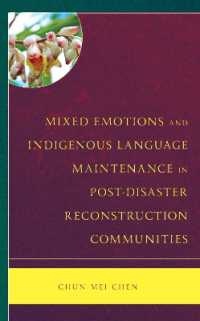- ホーム
- > 洋書
- > 英文書
- > Politics / International Relations
基本説明
Based on a comparison of six Asian cases, the book explores the dynamics of state formation and economic development in Asia.
Full Description
Why have some states in the developing world been more successful at facilitating industrialization than others? Challenging theories that privilege industrial policy and colonial legacies, this book focuses on state structure and the politics of state formation, arguing that a cohesive state structure is as important to developmental success as effective industrial policy. Based on a comparison of six Asian cases, including both capitalist and socialist states with varying structural cohesion, Tuong Vu proves that it is state formation politics rather than colonial legacies that have had decisive and lasting impacts on the structures of emerging states. His cross-national comparison of South Korea, Vietnam, Republican and Maoist China, and Sukarno's and Suharto's Indonesia, which is augmented by in-depth analyses of state formation processes in Vietnam and Indonesia, is an important contribution to understanding the dynamics of state formation and economic development in Asia.
Contents
Part I. Divergent National Paths of State Development: 1. State formation dynamics and developmental outcomes; 2. South Korea: confrontation and the formation of a cohesive state; 3. Indonesia: from accommodation to confrontation; 4. Rival state formations in China: the republican and Maoist states; 5. Vietnam: accommodation and arrested revolution; Part II. Variants of Accommodation: Vietnam and Indonesia Compared: 6. Organizing accommodation in Vietnam: coalition government, united front, and the Leninist party; 7. Organizing accommodation in Indonesia: parliament and status-based parties; 8. Talking accommodation in Vietnam: nation, the people, and class struggle; 9. Talking accommodation in Indonesia: nation, the people, God, and Karl Marx; 10. Rethinking developmental states; Bibliography.








